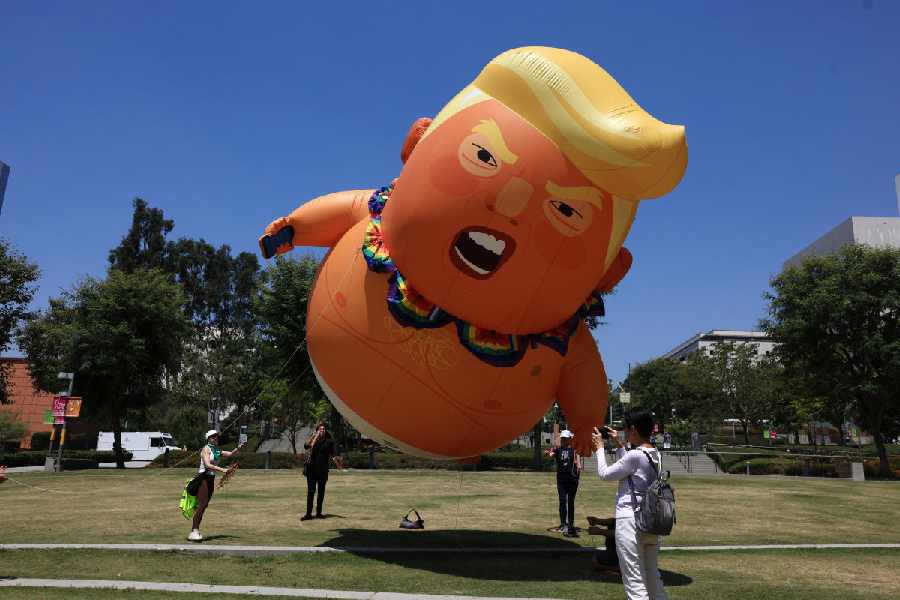An old rule in Washington holds that you are entitled to your own opinions but you are not entitled to your own facts. President Donald Trump seems determined to prove that wrong.
Don't like an intelligence report that contradicts your view? Go after the analysts. Don't like cost estimates for your tax plan? Invent your own. Don't like a predecessor's climate policies? Scrub government websites of underlying data. Don't like a museum exhibit that cites your impeachments? Delete any mention of them.
Trump's war on facts reached new heights on Friday when he angrily fired the labour department official in charge of compiling statistics on employment in America because he did not like the latest jobs report showing that the economy isn't doing as well as he claims it is. Trump declared that her numbers were "phoney". His proof? It was "my opinion". And the story he told supposedly proving she was politically biased? It had no basis in fact itself.
The message, however, was unmistakable: Government officials who deal in data now fear they have to toe the line or risk losing their jobs. Career scientists, longtime intelligence analysts and nonpartisan statisticians who serve every President regardless of political party with neutral information on countless matters, such as weather patterns and vaccine efficacy, now face pressure as never before to conform to the alternative reality enforced by the President and his team.
Trump has never been especially wedded to facts, routinely making up his own numbers, repeating falsehoods and conspiracy theories even after they are debunked and denigrating the very concept of independent fact-checking. But his efforts since reclaiming the White House to make the rest of government adopt his versions of the truth have gone further than in his first term and increasingly remind scholars of the way authoritarian leaders in other countries have sought to control information.
"Democracy can't realistically exist without reliable epistemic infrastructure," said Michael Patrick Lynch, author of the recently published "On Truth in Politics" and a professor at the University of Connecticut.
"Anti-democratic, authoritarian leaders know this," he said. "That is why they will seize every opportunity to control sources of information. As Bacon taught us, knowledge is power. But preventing or controlling access to knowledge is also power."
The British philosopher Francis Bacon published his meditations on truth and nature more than four centuries before Trump arrived in Washington, but history is filled with examples of leaders seeking to stifle unwelcome information.
Trump's advisers defended his decision to fire the labour department official, saying he was only seeking accuracy, and they released a list of recent job estimates that were later revised. While revisions of job creation estimates are normal, they argued without evidence that recent ones indicated a problem.
The bureau's "data has been historically inaccurate and led by a totally incompetent individual", Taylor Rogers, a White House spokesman, said on Saturday. "President Trump believes businesses, households and policymakers deserve accurate data when making major policy decisions, and he will restore America's trust in this key data."
Trump has spent a lifetime trying to impose his facts on others, whether it be claiming that Trump Tower has 10 more floors than it actually has or insisting that he was richer than he actually was. He went so far as to sue the journalist Timothy L. O’Brien for $5 billion for reporting that Trump's net worth was less than he maintained it was. The future President testified in that case that he determined his net worth based in part on "my own feelings". (The suit was dismissed.)
His fast-and-loose approach to numbers and facts finally caught up with him last year when he was found liable for fraud in a civil case in which a judge found that he used his annual financial statements to defraud lenders and ordered him to pay what has now exceeded $500 million with interest. Trump has appealed the ruling.
During his first term as President, Trump chastised the National Park Service for not backing up his off-the-top-of-his-head estimate of the crowd size at his inauguration. He used a Sharpie pen to alter a map to argue that he was right to predict that a hurricane might hit Alabama, and federal weather forecasters were rebuked for saying it would not.
Most explosively, he pressured justice department officials to falsely declare that the 2020 election was corrupt and therefore stolen from him even after they told him there was no evidence of widespread voter fraud.
This second term, however, has seen Trump go further to force his facts on the government and get rid of those standing in the way. After just six months of his return to office, the Union of Concerned Scientists, a nonprofit advocacy group, counted 402 of what it called "attacks on federal science", nearly double its count from the entire first term.
In recent days, Trump has also sought to rewrite the history of the 2016 election when, according to multiple intelligence reports and investigations, including by Republicans, Russia intervened in the campaign with the goal of helping him beat Hillary Clinton. Gabbard released documents that she claimed showed that in fact President Barack Obama orchestrated a "yearslong coup and treasonous conspiracy" against Trump, even though the documents she released did not prove that.
New York Times News Service










